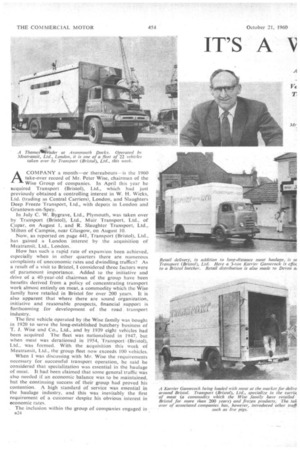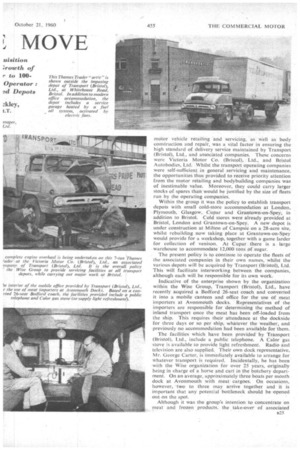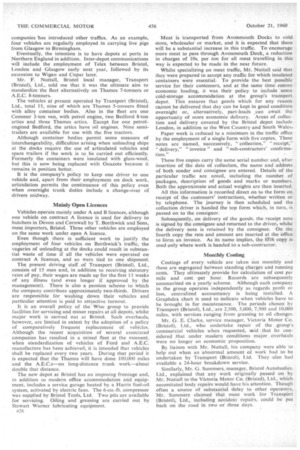IT'S A MOVE
Page 58

Page 59

Page 60

If you've noticed an error in this article please click here to report it so we can fix it.
ACOMPANY a month—or thereabouts—is the 1960 take-over record of Mr. Peter Wise, chairman of the Wise Group of companies. In April this year he acquired Transport (Bristol), Ltd., which had just previously obtained a controlling interest in W. H. Wicks, Ltd. (trading as Central Carriers), London, and Slaughters Deep Freeze Transport, Ltd., with depots in London and Grantown-on-Spey.
In July C. W. Bygrave, Ltd., Plymouth, was taken over by Transport (Bristol), Ltd., Muir Transport, Ltd., of Cupar, on August 1. and R. Slaughter Transport, Ltd., Milton of Campsie, near Glasgow, on August 10.
Now, as reported on page 441, Transport (Bristol), Ltd., has gained a London interest by the acquisition of Meatransit, Ltd., London.
How has such a rapid rate of expansion been achieved, especially when in other quarters there are numerous complaints of uneconomic rates and dwindling traffics? As a result of a visit to Bristol, I considered three factors were of paramount importance. Added to the initiative and drive of a 40-year-old chairman of the group have been benefits derived from a policy of concentrating transport work almost entirely on meat, a commodity which the Wise family have retailed in Bristol for over 200 years. It is also apparent that where there are sound organization, initiative and reasonable prospects, financial support is forthcoming for development of the road transport industry.
The first vehicle operated by the Wise family was bought in 1920 to serve the long-established butchery business of T. J. Wise and Co., Ltd., and by 1939 eight vehicles had been acquired The fleet was nationalized in 1947. but when meat was derationed in 1954, Transport (Bristol), Ltd., was formed. With the acquisition this week of Meatransit, Ltd., the group fleet now exceeds 100 vehicles.
When I was discussing with Mr. Wise the requirements necessary for successful transport operation, he said he considered that specialization was essential in the haulage of meat. It had been claimed that some general traffic was also needed if an economic balance was to be maintained, but the continuing success of their group had proved his contention. A high standard of service was essential in the haulage industry, and this was inevitably the first requirement of a customer despite his obvious interest in economic rates.
The inclusion within the group of companies engaged in motor vehicle retailing and servicing, as well as body construction and repair, was a vital factor in ensuring the high standard of delivery service maintained by Transport (Bristol), Ltd., and associated companies. These concerns were Victoria Motor Co. (Bristol), Ltd., and Bristol Autobodies, Ltd. Whilst the transport operating companies were self-sufficient in general servicing and maintenance, the opportunities thus provided to receive priority attention from the motor retailing and bodybuilding companies was of inestimable value. Moreover, they could carry larger stocks of spares than would be justified by the size of fleets run by the operating companies.
Within the group it was the policy to establish transport depots with small cold-store accommodation at London, Plymouth. Glasgow, Cupar and Grantown-on-Spey, in addition to Bristol. Cold stores were already provided at Bristol, London and Grantown-on-Spey. A new depot is under construction at Milton of Campsie on a 28-acre site, whilst rebuilding now taking place at Grantown-on-Spey would provide for a workshop, together with a game larder for collection of venison. At Cupar there is a large warehouse to accommodate 12,000 tons of sugar.
The present policy is to continue to operate the fleets of the associated companies in their own names,whilst the various depots will be acquired by Transport (Bristol), Ltd. This will facilitate interworking between the companies, although each will be responsible for its own work.
Indicative of the enterprise shown by the organization within the Wise Group, Transport (Bristol), Ltd., have recently acquired a Bedford 26-seat coach and converted it into a mobile canteen and office for the use of meat importers at Avonmouth docks. Representatives of the importers are responsible for determining the method of inland transport once the meat has been off-loaded from the ship. This requires their attendance -at the dockside for three days or so per ship, whatever the weather, and -previously no accommodation had been available for them.
The facilities which have been provided by Transport (Bristol). Ltd., include a public telephone. A Calor gas stove is available to provide light refreshment. Radio and television are also supplied. Their own dock representative. Mr. George Carter, is immediately available to arrange for Whatever transport is required. Incidentally, he has been
• with the Wise organization for over 25 years, originally being in charge of a horse and cart in the butchery department. On an average, approximately three boats per month dock at Avonmouth with meat cargoes. On occasions, however, -two to three may arrive together and it is important that any potential bottleneck should be opened out on the spot.
Although it was the group's intention to concentrate on meat and frozen products, the take-over of associated B25 companies has introduced other traffics. As an example, four vehicles are regularly employed in carrying live pigs from Glasgow to Birmingham. • Eventually, the intention is to have depots at ports in Northern England in addition. Inter-depot communications will include the employment of Telex between Bristol, London and Glasgow early next year, followed by its extension to Wigan and Cupar later.
Mr. F. Nuttall, Bristol local manager, Transport (Bristol), Ltd., told me that it was the ultimate aim to standardize the fleet alternatively on Thames 7-tonners or A.E.C. 8-tonners.
The vehicles at present operated by Transport (Bristol), Ltd., total 15, nine of which are Thames 5-tonners fitted with alloy container bodies. Also in the fleet are one Commer 3-ton van, with petrol engine, two Bedford 8-ton artics and three Thames artics. Except for one petrolengined Bedford, the artics have oil engines. Nine semitrailers are available for use with the five tractors.
Although container bodies permit some measure of interchangeability, difficulties arising when unloading ships at the docks require the use of articulated vehicles and spare trailers if the work is to be carried out efficiently. Formerly the containers were insulated with glass-wool, but this is now being replaced with Onazote because it remains in position better.
It is the company's policy to keep one driver to one vehicle and, apart from their employment on dock work, articulation permits the continuance of this policy even when overnight trunk duties include a change-over of drivers midway.
Mainly Open Licences
Vehicles operate mainly under A and B licences, although one vehicle on contract A licence is used for delivery to butchers in Devon and Cornwall by T. Borthwiek and Sons, meat importers, Bristol. Three other vehicles are employed on the same work under open A licence.
Even though there is sufficient work to justify the employment of four vehicles on Borthwick's traffic, the vagaries of unloading at the docks could result in substantial waste of time if all the vehicles were operated on contract A licences, and so were tied to one shipment.
The present driving staff of Transport (Bristol), Ltd., consists of 15 men and, in addition to receiving statutory rates of pay, their wages are made up for the first 13 weeks of any illness (and even longer if approved by the management). There is also a pension scheme to which the company contribute approximately two-thirds. Drivers are responsible for washing down their vehicles and particular attention is paid to attractive turnout.
It is an overall policy of the Wise group to provide facilities for servicing and minor repairs at all depots, whilst major work is carried out at Bristol. Such overhauls, however, are limited in extent by the adoption of a policy of comparatively frequent replacement of vehicles. Although the recent acquisition of several associated companies has resulted in a mixed fleet at the moment, when standardization of vehicles of Ford and A.E.C. manufacture has been achieved, it is intended that vehicles shall be replaced every two years. During that period it is expected that the Thames will have done 100,000 miles and the A.E.C.s—on long-distance trunk work—about double that distance.
The new depot at Bristol has an imposing frontage and, in addition to modern office accommodation and equipment, includes a service garage heated by a Harris fuel-oil system, activated by electric fans. The 6-cu.-ft. compressor was supplied by Bristol Tools, Ltd. Two pits are available for servicing. Oiling and greasing are carried out by Stewart Warner lubricating equipment.
B26 Meat is transported from Avonmouth Docks to cold store, wholesaler or market, and it is expected that there will be a substantial increase in this traffic. To encourage more meat to pass through Avonmouth Dock, a reduction in charges of 10s. per ton for all meat travelling in this way is expected to be made in the near future.
Whilst specializing on meat traffic, Mr. Nuttall said that they were prepared to accept any traffic for which insulated containers were essential. To provide the best possible service for their customers, and at the same time ensure economic loading, it was their policy to include some cold-storage accommodation at the group's transport depot. This ensures that goods which for any reason cannot be delivered that day can be kept in good condition overnight or, alternatively, part-loads can await the opportunity of more economic delivery. Areas of collection. and delivery covered by the Bristol depot include London, in addition to the West Country and South Wales, Paper work is reduced to a minimum in the traffic office by the employment of a single form with five copies. These notes are named, successively, "collection," " receipt," "delivery," " invoice " and "sub-contractors' confirmation."
These five copies carry the same serial number, and, after insertion of the date of collection, the name and address of both sender and consignee are entered. Details of the particular traffic are noted, including the number. of packages, description of goods and marks or numbers. Both the approximate and actual weights arc then inserted.
All this information is recorded direct on to the form on receipt of the customers' instructions, whether written or by telephone. The journey is then scheduled and the collection driver is handed the top form which, in turn, is passed on to the consignor.
Subsequently, on delivery of the goods, the receipt note is signed by the consignee and returned to the driver whilst the delivery note is retained by the consignee. On the fourth copy the rate and amount are inserted at the office to form an invoice. As its name implies, the fifth copy is used only where work is handed to a sub-contractor.
Monthly Costing Costings of every vehicle are taken 'Out monthly and these. are segregated between standing charges and running costs. They ultimately provide for calculation of cost per mile and cost 'per hour. Records are subsequently summarized on a yearly scheme. Although each company in the group operates independently as. regards profit or loss, centralized accountancy is being installed. A Graphdex chart is used to indicate when vehicles have to be brought in for maintenance.. The periods chosen by Transport (Bristol), Ltd.,•are 2,500, 5,000, 7,500 and 10,000 miles, with services ranging from greasing to oil changes.
Mr. G. E. Clarke, service manager, Victoria Motor Co. (Bristol), Ltd., who undertake repair of the group's commercial vehicles when requested, said that he considered that under modern conditions major, overhauls were no longer an economic proposition,
By liaison with Mr. Nuttall, his company were able to help out when an abnormal amount of work had to be undertaken by Transport (Bristol), Ltd. They also had available a 24-hour breakdown service.
Similarly, Mr. G. Summers, manager, Bristol Autobodies, Ltd., explained that any work originally passed on by Mr. Nuttall to the Victoria Motor Co. (Bristol), Ltd., which necessitated body repairs would have his attention. Though often a source of substantial delay to other operators, Mr. Summers claimed that most work for Transport (Bristol), Ltd., including accident repairs, could be put back on the road in two or three days.




















































































































